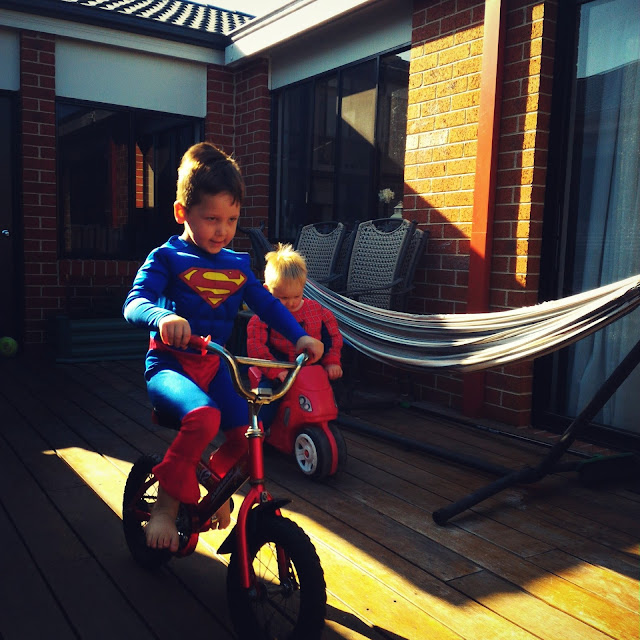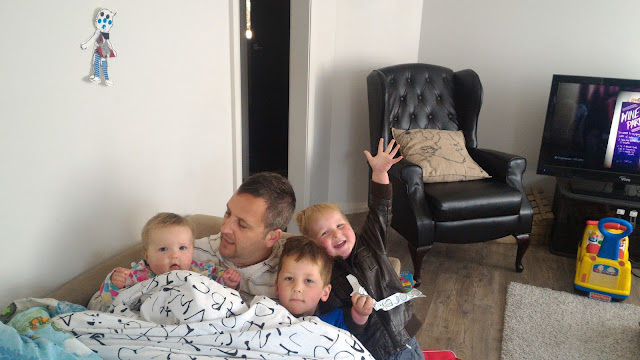I feel as if I'm in the process of learning an entirely new language. (Actually make that two new languages because I've just downloaded an Italian language app on my phone to fill up all that free time I have.)
Ever since my introduction to parenting four and a half years ago, I've been firmly planted in the 'punishments for bad behaviour' zone. You do something naughty, I will do my best to make sure there is some sort of penalty for that behaviour so that I don't have to put up with it again. And it has largely been successful.
Until recently.
Eli's foray into the tempestuous fourth year of his life has been fraught with emotion... for all of us. Sometimes the emotions are just too big and confusing for him to handle and we've had our increasing share of enraged tantrums, often ending in him being sent to his room where he takes out his frustration by banging the door shut over and over, or unleashes on the walls. He has 'trashed' his room a number of times, and sometimes, if Hudson haplessly wanders by at the wrong moment, or (like a kamikaze) chooses to 'visit' Eli in time out, the rage will spill out onto him as well.
The trigger points are varied, but usually center around extreme frustration, being misunderstood, having his independence thwarted or his game disturbed. I've used 'time out' liberally, as well as taking away his screen time, and have had to resort to smacking at times if I'm out of other options. Needless to say, it hasn't been that much fun for any of us.
Then I came across 'How to Talk so that Kids Will Listen, and Listen so Kids Will Talk' by Adele Faber and Elaine Mazlish. There has only been one other time in my life (Richard Rohr's 'Falling Upward: A Spirituality for the Two Halves of Life') that I have had the vivid experience of 'living' a book and it is such a tumultuous and exhilarating feeling. I would read a chapter one day, then spend the next day or two implementing and practicing....and failing. Then read the next chapter, feel ecstatic that I'd found a solution to the failings of yesterday, and repeat the process all over again. Now that I've completed the book, I've even started reading it again and found fresh insights and emphases that I must have skimmed over on the previous attempt.
From my understanding, the premise of the book is that if you can empathise with your children, show them that you 'get' their feelings and accept them, you can work together to problem solve solutions and fix behavioural issues. It is all about releasing and empowering your children to figure things out themselves, rather than micro-managing and repeating instructions over and over in your 'nice' voice. Oh how I needed that! My 'nice' voice was petering out quicker and quicker and the 'frustrated and angry' voice was fast replacing it!
A particularly releasing view for me has been the freedom from trying to pretend that you are feeling patient when you are anything but. This approach tends to lead to even more explosive reactions when you add onto the original offence the insult that you have tried to be nice and the kids STILL didn't listen! The better way is to put them on alert earlier that you are starting to feel frustrated and irritated, and it is surprisingly successful. After receiving a few of these warnings Eli now reacts with curiousity when I explain that I'm starting to get cross. "How cross?" He asks with keen interest.
Another watershed moment for me was the chapter called Punishment. The book proposes that "the problem with punishment [is] that it [doesn't] work, that it [is] a distraction, that instead of the child feeling sorry for what he has done and thinking about how he can make amends, he becomes preoccupied with revenge fantasies" and that "by punishing a child we actually deprive him of the very important inner process of facing his own misbehavior." The approach then is ensure a child experiences the "consequences of his misbehavior" instead, while being communicative about your expectations, pointing out ways for them to be helpful and expressing strong disapproval over unwanted behaviour.
The most difficult part of learning a new language is feeling out of your depth in the new culture. Over the weekend Dave and I felt as if we had been thrown in the deep end, having been confronted with one of the worst outbursts yet from Eli following a change of plans for going to the beach. I'm talking uncontrollable rage, hitting and kicking Dave, tearing off and breaking the window shades in the car. All the usual methods were out, and I largely let Dave bear the brunt of it because his patience far, far outweighs mine in these circumstances. Eli eventually calmed down (after being isolated in the car and us having to abandon the park that we had just arrived at for a BBQ dinner) and we were able to talk to him about our reasons for not staying at the beach (super wild weather and waves). We communicated to him that the natural consequences for his behaviour would be that we didn't want to take him to the beach again with us and that he would have to miss out next time, and asked him how he could fix the problem of the broken window shades. He replied, "I think I have a twenty dollar in my money box".
I'm having to fight my urge to 'punish' the kids now, which I have found usually arises out of embarrassment, frustration or anger, and being forced to acknowledge the uncomfortable presence of these emotions without the usual resolution is becoming a positive thing for my own development.
The biggest pay off, however, is that Eli almost seems like a new boy at times. He is rising to the challenge of using words to express his anger and finding phrases other than 'mean Mummy' or 'bad, bad Dad'. Tonight he made an 'action plan' of what he was going to clean up and executed each part of the plan with precision. When Dave offered to help Eli clean his room but got distracted, Eli even managed to calmly communicate his disappointment in Dave's lack of assistance without getting lost in a rage-filled frenzy. When Eli wasn't shamed for his out of control feelings at the park and realised that we really do just want to work through things with him, it felt like a watershed moment for us all.
One of the sentiments in the book that really struck a chord with me was the line that although we may always feel as if we are speaking this language with a foreign accent as we muddle through and practice on our children, for them, this language will be their native tongue. A language that respects, empowers, celebrates and releases them to autonomy and independence. So much better than the tongue of frustration, resentment, control and shame that I had begun to master.
We are by no means experts in this parenting game, and I suspect we will have a lot more learning to do before we truly grasp the profundity of the Faber/Mazlish approach, but I feel so much more calm and positive about the future. And- as both my Mum and Mother in Law have pointed out- if this approach doesn't work, we can always try a different one!
Starting Over
The Very Cranky Mummy
BloggerEmma is a former lawyer, now full-time mum to three rambunctious kids- Eli, Hudson and Ivy. This blog helps keep her (almost) sane and for that Dave, her husband, is very grateful.




















0 comments:
Post a Comment